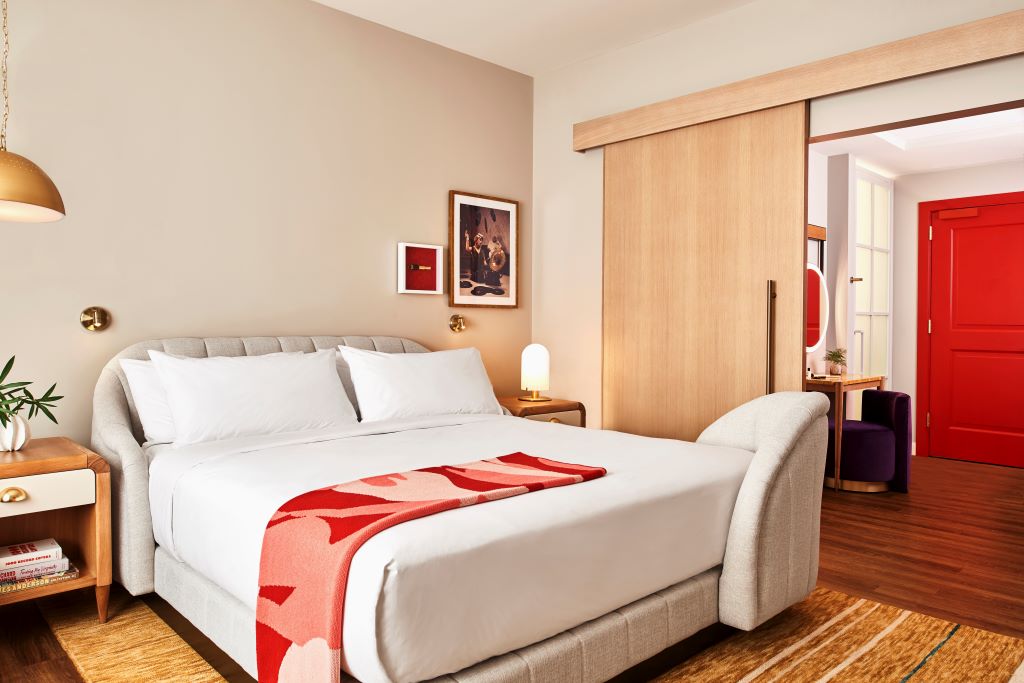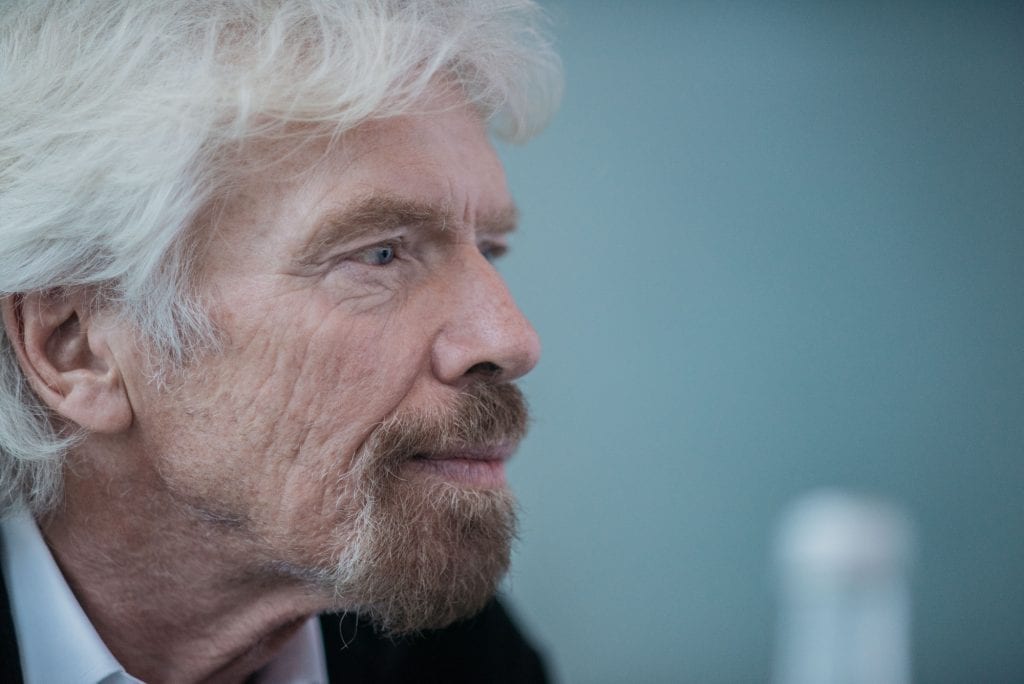Skift Take
Richard Branson created Virgin Hotels nine years ago, promising to deliver about two dozen boutique hotels with flair. So far, only three hotels have opened. Will it be able to accelerate its growth in 2020?
When British billionaire Richard Branson announced in 2010 that he would create the Virgin Hotels lifestyle brand, he promised that it would disrupt the hospitality industry. The brand made its splashy debut in Chicago in 2015. Branson flew in for it, conducting interviews with journalists in the Shag Room of The Commons Club with no shoes on. He promised to provide a fun, edgy, affordable alternative to every other lifestyle brand out there, of which there are many.
It’s a pronouncement the company still makes, but nearly a decade later, it hasn’t exactly lived up to that ambitious promise.
The company opened its third hotel, a 268-room property in Dallas’ Design district, on Sunday. Virgin Hotels San Francisco opened in February. The very first Virgin Hotel debuted in Chicago in 2015.
Three properties in nine years is not exactly what makes a brand an industry disruptor.
Virgin Hotels CEO Raul Leal said that will change in 2020, with the opening of three hotels, including the 1,500 room Virgin Hotels Las Vegas that will take over what was once the Hard Rock Hotel.
A Virgin Hotel is scheduled to debut in Nashville in April. Properties in New York and Las Vegas are supposed to open next fall. Virgin Hotels New Orleans is slated for May 2021. Its first international hotel will open in Edinburgh in June 2021. Miami, where the company has its headquarters, will follow in 2023.
The company has been plagued by construction delays, partly due to a labor shortage and partly due to unforeseen circumstances. The New York property, for instance, has been pushed back by about a year because construction workers realized they had to dig deeper than they thought to anchor the building, Leal said.
Even though Branson originally said that the company would have up to two dozen properties in operation within seven years, Leal said the plan was always to have a measured rollout.
“For us it was never going to be about scale. We were never going to be a company that had 50 to 100 hotels,” Leal told Skift. “The original plan, which is still in effect, was to have 20 to 25 really cool hotels around the world in main cites and secondary markets and to make sure we got it right. It wasn’t just going to be another homogenous building somewhere that we just say, ‘let’s do it.’”
Leal doesn’t regret taking his time. “We’ve turned down lots of things, locations that we didn’t feel great about,” he said.
The locations the company has chosen are markets where empty land is neither cheap nor easy to find. The economy has had an upturn in the nine years since Virgin Hotels was created, driving real estate prices higher.
“These urban center deals have been subjected to the longest delays for any active projects,” said Bruce Ford, senior vice president and director of global business development for research firm Lodging Econometrics.
Virgin has also chosen some difficult projects. The Chicago hotel used to be the Old Dearborn Bank Building, originally built in 1928. Turning it into a 250-room hotel involved restoring the original ceilings while following historic preservation guidelines. Construction workers also had to add a 2,500 square-foot balcony for a rooftop bar.
The boutique and lifestyle hotel market is also a much more competitive one than it was a decade ago.
The biggest brands in the world have crowded the sector by creating or buying their own lifestyle brands. Marriott partnered with industry pioneer Ian Schrager to create Edition Hotels. Accor inherited MGallery by Sofitel when it purchased the Sofitel brand. Intercontinental Hotels Group bought Kimpton Hotels. Hyatt recently created the Caption brand.
It’s difficult for small companies like Virgin Hotels to lure developers away from such behemoths.
“The big brands are so large that hotel owners who have the chance to affiliate with (them) realize if they don’t go with one of the big brands, they’d miss out on an enormous demand creation machine,” said Henry Harteveldt, president of Atmosphere Research Group. “It’s very hard for Virgin to compete as a startup against mega hotel brand groups like Marriott International, Accor, Hilton, and others.”
Another problem: The Virgin Group brand just isn’t what it used to be even with a leader as charismatic and famous as Branson. The tycoon is known for hyping his products. But he doesn’t always deliver. One of his airlines, Virgin America, was acquired by Alaska Airlines. His other one, Virgin Atlantic, has never gotten big enough to compete with British Airways.
“The Virgin brand simply doesn’t have the cachet that is used to 10 or more years ago,” Harteveldt said.
That’s not to say Branson is giving up on the travel industry. The express intercity Brightline in Florida was rebranded as Virgin Trains USA and has Virgin Group as a minority investor. The Virgin Voyages cruise line will debut next year.
Leal said the company is offering a product that is different from other lifestyle brands out there. The hotels are decked out in Virgin’s signature red color. The Commons Club and rooftops have become trendy destinations. And the price point is affordable.
A standard room at the Chicago property could go for around $150. Rooms in the San Francisco and Dallas hotels start in the low to mid-$200 range. None of the Virgin hotels charge resort fees and minibar items are offered at market prices. Members of the hotel company’s loyalty program, The Know, get complimentary drinks every night.
“We’re the bridge between the legacy hotels like the Marriotts and the Hiltons and the lifestyle hotels in today’s market,” Leal said. “You don’t really know what you’re going to get with them. We offer a better point of view, making sure we’re not nickel and diming people to death.”
Harteveldt said it makes sense for the company to take its time to turn out a viable product.
“What’s more important for Virgin is that they do it right rather than they do things fast,” he said. “Having the wrong owner, having the wrong location, having the wrong property would all be far worse for the hotel than opening a hotel simply to put a pin on the map or light up.”
But the company does have to do something to gain momentum. That’s how smaller hotel companies survive
“They do need to reach a critical mass of properties and markets in the next three to five years or I’m concerned property owners will say, no it’s just not worth it,” Harteveldt said.
Have a confidential tip for Skift? Get in touch
Tags: hyatt, marriott, richard branson, virgin hotels
Photo credit: The Virgin Hotels Dallas opened on Dec. 15. It is the third Virgin Hotel to open. Virgin Hotels

